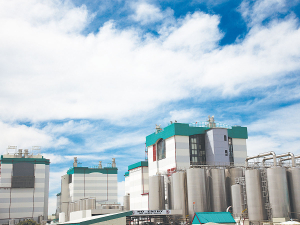Another Windfall for Fonterra Farmers, Unit Holders
Fonterra farmer shareholders and unit holders are in line for another payment in April.
 Fonterra’s new electrode boiler at Edendale site will reduce emissions by around 20% or 47,500 tonnes of carbon dioxide equivalent per annum.
Fonterra’s new electrode boiler at Edendale site will reduce emissions by around 20% or 47,500 tonnes of carbon dioxide equivalent per annum.
Fonterra is installing a $36 million 20-megawatt electrode boiler at its Edendale site in Southland, as the co-op moves away from coal.
The electrode boiler will reduce the Edendale site's emissions by around 20% or 47,500 tonnes of carbon dioxide equivalent per annum - the equivalent of taking almost 20,000 cars off NZ roads.
It will also help reduce Fonterra's overall carbon emissions from its NZ 2018 baseline by nearly 3% per annum once operational in 2025-26.
Fonterra says the investment is another step for the co-operative as it works to get out of coal by 2037 and reduce Scope 1 and 2 emissions by 50% by 2030 (from 2018 baseline).
Fonterra acting chief operating officer Anna Palairet says the team considered a number of energy options before deciding on the electrode boiler.
"Fonterra has a complex manufacturing operation spanning the country.
"As technologies develop, it's important we continually assess which energy source and technology is best for each site.
"With up to 15 million litres of milk being processed at our Edendale site each day, we need to ensure we have a secure energy supply that can meet processing demands."
Cost is also an important consideration.
Palairet says getting out of coal requires significant investment and the co-op needs to choose the best option that reduces emissions and operational complexity while also doing what's best for farmer shareholders.
Fonterra is partnering with Meridian Energy for the electricity supply who generate electricity from 100% renewable resources - wind, water, and sun.
Environment Southland is welcoming this week’s decision by the Environmental Protection Authority (EPA) to approve the release of Blaptea elguetai, a leaf‑feeding beetle that will help control the highly invasive Chilean flame creeper.
This March, the potato industry is proudly celebrating International Women’s Day on 8 March alongside the International Year of the Woman Farmer, recognising the vital role women play across every part of the sector — from paddocks and packhouses to research, leadership, and innovation.
Fruit trader Seeka posted a record profit and returns to shareholders in 2025.
Recent weather events in the Bay of Plenty, Gisborne/Tairawhiti, and Canterbury have been declared a medium-scale adverse event.
DairyNZ's chief executive Campbell Parker says the 2024/25 dairy season reinforces the importance of the dairy sector to New Zealand.
A New Zealand agribusiness helping to turn a long-standing animal welfare and waste issue into a high-value protein stream has won the Australian dairy sector's top innovator award.

OPINION: A mate of yours truly reckons rural Manawatu families are the latest to suffer under what he calls the…
OPINION: If old Winston Peters thinks building trade relations with new nations, such as India, isn't a necessary investment in…